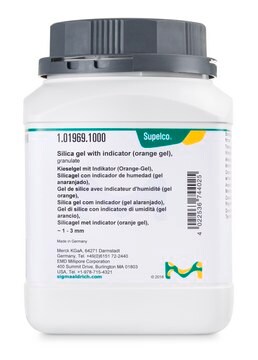60737
Silica gel Inorganic Sorbent
high-purity grade, 230-400 mesh
About This Item
Produits recommandés
product name
Gel de silice, high-purity grade, pore size 60 Å, 230-400 mesh particle size, 40-63 μm particle size, for flash chromatography
Qualité
high-purity grade
Niveau de qualité
Forme
powder
Fabricant/nom de marque
Sigma-Aldrich
Technique(s)
LPLC: suitable
Superficie
530 m2/g
Impuretés
3-7% water
Matrice
Silica
Groupe de la matrice active
silica
Taille des particules
230-400 mesh
40-63 μm
Dimension de pores
0.8 cm3/g pore volume
60 Å
Point d'ébullition
2230 °C
Pf
>1600 °C
Technique de séparation
hydrophilic interaction (HILIC)
Chaîne SMILES
O=[Si]=O
InChI
1S/O2Si/c1-3-2
Clé InChI
VYPSYNLAJGMNEJ-UHFFFAOYSA-N
Vous recherchez des produits similaires ? Visite Guide de comparaison des produits
Description générale
a. Aquagel - les pores sont remplies d′eau
b. Xerogel - par un processus d′évaporation, la phase aqueuse des pores est éliminée
c. Aerogel - le solvant est éliminé par extraction supercritique
Application
- Modulating the properties and structure of lignins produced by alkaline delignification of sugarcane bagasse pretreated with two different mineral acids at pilot-scale: Demonstrates the use of high-purity sulfuric acid in the pretreatment of sugarcane bagasse, crucial for enhancing the quality of lignin extracted for further biochemical applications, pivotal for research in material science and environmental sustainability (Nunes da Silva et al., 2024).
Code de la classe de stockage
11 - Combustible Solids
Classe de danger pour l'eau (WGK)
nwg
Point d'éclair (°F)
Not applicable
Point d'éclair (°C)
Not applicable
Équipement de protection individuelle
Eyeshields, Gloves, type N95 (US)
Faites votre choix parmi les versions les plus récentes :
Déjà en possession de ce produit ?
Retrouvez la documentation relative aux produits que vous avez récemment achetés dans la Bibliothèque de documents.
Les clients ont également consulté
Notre équipe de scientifiques dispose d'une expérience dans tous les secteurs de la recherche, notamment en sciences de la vie, science des matériaux, synthèse chimique, chromatographie, analyse et dans de nombreux autres domaines..
Contacter notre Service technique

